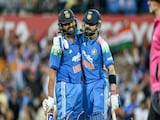The Supreme Court on Monday refused to rule on the validity of President's Rule in Jammu and Kashmir - imposed in December 2018 - since it was not specifically challenged by petitioners as part of an overall contesting of the scrapping of special status, under Article 370, to the former state.
The court also seemed to warn against challenges to "decisions taken by the Union on behalf of the State (when President's Rule is in effect) for day-to-day administration", flagging possible "chaos".
"... petitioners in the writ petitions indicate their principal challenge is to the abrogation of Article 370 and whether such an action could have been taken during President's Rule," it said, pointing out that even if it did rule in petitioners' favour, "there can be no material relief which can be given".
"... every decision (taken by) the Centre on behalf of State under Article 356 (imposition of President's Rule) cannot be challenge. When proclamation under Article 356 is implemented, countless decisions are taken by the Centre... not every decision can be challenged. If challenges are allowed, it would lead to chaos," Chief Justice DY Chandrachud, heading a five-judge bench, said.
The court was responding to one of eight questions that formed the crux of the challenges.
READ | "I Want To Assure...": PM's Message To Jammu And Kashmir After Big Ruling
Specifically, the court asked "if the proclamation issued by the President under Article 356 of the Constitution on December 19, 2019, and the subsequent extensions are constitutionally valid?"
Petitioners arguing against Article 370 had claimed the centre could not take actions that have "irreversible consequences" - a reference to the revocation of statehood - when a proclamation - such as President's Rule - is in force. The court dismissed this challenge as "not accepted".
READ | Centre's Move To Scrap Special Status To J&K Valid: Supreme Court
Jammu and Kashmir came under President's Rule on December 19, 2018, for an initial period of six months. This was after a political crisis in June that year precipitated by the BJP withdrawing support to then ruling People's Democratic Party government led by ex-Chief Minister Mehbooba Mufti.
Since then, there have been multiple extensions.
On August 5, 2019, the centre scrapped Jammu and Kashmir's semi-autonomous position and special status under Article 370 and revoked statehood. Since then, no Assembly election has been held.
READ | "Wounds Require Healing": Justice Kaul's Separate Order On Article 370
Today, in the face of multiple challenges, the court upheld the centre's August 2019 decision and ruled it "valid", calling it a temporary provision to ease the former state's 1947 merger with India. In line with that ruling, the court also directed the centre to restore statehood as soon as possible.
READ | J&K Didn't Retain Sovereignty When It Joined Union Of India: Chief Justice
The presidential order to scrap Article 370 was upheld by all five judges on the bench.
The Election Commission has been told to conduct an Assembly election by September 30, 2024.
In June this year, Jammu and Kashmir completed five years under control of the central government - the second-longest period of President's Rule in the country since Independence.















